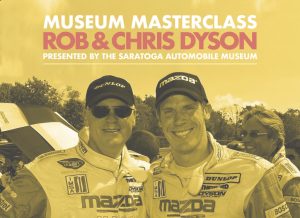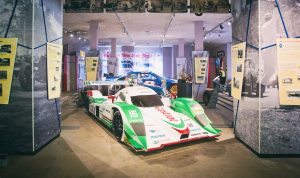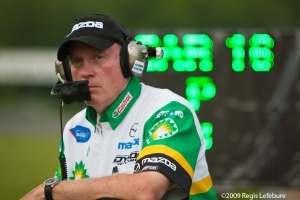A fan favorite and true sports car legend, Butch Leitzinger drove full-time for Dyson Racing for fifteen years and is still a member of the Dyson family having most recently driven for the team at last year’s Petit Le Mans and at Mazda Raceway Laguna Seca.
He has thirty-four victories driving for Dyson Racing including two at the 24 Hours of Daytona. He won the IMSA Sportscar Championship twice and the CanAm championship with Dyson Racing. In addition to his accomplishments as a Dyson driver, he has a third 24 Hour of Daytona victory to his credit, a 24 Hour of Le Mans podium, an IMSA GTU championship, Trans Am wins and multiple wins in NASCAR’s Busch North Series.
James Weaver, a twenty-year veteran of Dyson Racing, once said of Butch’s talent: “It is extraordinary how much ability he has. He is such a natural. He does not have to sit in the car for two hours to get a handle on it, he gets on the pace instantly. Butch always takes everything in stride and always performs superbly.”
Here is the second part of a three-part interview with Butch:
James Weaver use to say that with Rob Dyson, more often than not, there would not be a contract – just a hand shake. Was it the same with you?
“Technically, there usually was a contract. But quite often the contract would be signed at the end of the year! Rob would say, ‘oh by the way, I have this in the briefcase.’ There were years when there was no contract and if it was a contract, it was just a simple document. It was always straight forward and dealing with Rob and Pat Smith, everything was always above board and you were dealing with honest people with no agendas.”
What are some of your favorite drivers to race against?
“James and Andy Wallace were always the most fun to race against. With Andy, it was like following an artist, all the apexes would be clipped absolutely perfectly and the car would drift out to the exact edge of the pavement. Everything was so perfect when he was driving. You could race him really hard, side by side and never touch. You would go through corner after corner next to him just knowing that he was going to race you extremely hard but was not going to drill you. With James, it was the opposite! With him, you knew that if you left half a car width on the inside, he would fill that car width and go for it. But it was always done in good fun and whenever Rob would let the two cars battle, it was always a real fun drive.”
Did you ever consider a career in open wheel racing?
“I did at a couple points, but honestly, there was one time when I was looking into Indy cars and I was co-driving with John Paul Jr. at the time, and John had a large crash testing at Indy. John was such a huge talent, he was way more talented than I was, and I thought that if John can have a crash like that, what chance do I have? This was at a time when a lot of people were getting banged up at Indy. So it lost its appeal for me. Besides, I grew up with sports car racing and that was my real love. If I was going to do Indy, it was because it was something that I was expected to do, or it was a marker of success as opposed to a real desire.”
What is the most colorful personality you have come across in racing?
“I would have to say the Dyson group: the whole group pretty much has that market cornered! Between Rob, Chris, James, Andy, John Paul, Elliott (Forbes-Robinson), Peter Weston, Pat Smith, Guy, Vince Wood – everyone on the team has pretty unique perspectives. I think that is one of the best things about racing with Dyson. It was not just the fact that the cars were so well prepared, it was that you actually looked forward to seeing everybody. It was like going to camp – you were seeing a bunch of friends you would see twelve weekends a year and you really looked forward to the next time when you got to talk to everybody.”
I think it was James Weaver described you as Jekyll and Hyde – you are laid back when you are out of the car and when you are in the car, you are totally different. Do you agree with that assessment?
“I had not thought about it a whole lot until somebody mentioned that. But it is true. I do become much more mercenary, selfish, and aggressive in the car. I am definitely not like that as a person. I do tend to be mellower out of the car, but unfortunately those traits do not translate very well to racing. Just by the nature of competition, you have to be much more aggressive. For me, it is pretty much a switch, from when you first turn the ignition on.”
Are you a better driver when you are in front, or pursuing?
“It is certainly more fun to be pursuing. You can go for broke and drive as hard as you possibly can. When you are leading, I try to manage things, not get too big of a lead so as to not use the car up, and make sure there is always something left in case you need it. Aggression is always much more fun than managing.”
What defines Dyson Racing?
“I think the biggest thing is paying attention to what matters and not getting bogged down with things that do not. A lot of teams spend a lot of time on things that do not win races, but Rob and Chris are very good at stopping and saying, ‘how does this actually help us win a race?’ They have never lost sight of the fact they are there to win races.”
Some drivers talk about being in a special zone when in the car, especially during qualifying. Is there a zone you get into when you are “really on it?”
“There is kind of a rhythm you get sometimes where you know by second nature what to do in the car – how far you can push it and where you are not having to be a slave to brake markers and turn-in points. Everything is flowing on its own, and you are able to do special things with the car. That is not something that necessarily happens to me all the time. I suppose that is a mark of the great drivers – where this is something they can maintain every time they get in the car. For me, everything has to be aligned perfectly for it to happen.”
What do you do to relax?
“I spend as much time as I can at home. My wife and I like to bicycle a lot and spend time with the kids. Our daughter is seven and our son is three. They are really at fun ages and we get to do a lot of stuff with them. In non-racing times, I just try to spend a lot of time at a slower speed.”
What do you do for vacations?
“My wife’s family has a cabin on a lake and it is just absolutely beautiful country. We usually spend a couple weeks a summer there and every time we are there, we marvel at how peaceful and how beautiful it is. It is such a wonderful place to relax.”
What is the best part of being a race car driver?
“Racing extenuates personalities a lot. You meet some of the best people you have ever met in your life through racing and you also you meet some people who are not as nice. But the good people you meet – you get so much more benefit from the good people than you do the negative.”
For a number of years, you have been an ambassador for Bugatti and doing customer test drives with their Veyron. How did you get that gig?
“I drove for Bentley at Le Mans in 2001 and 2002. (Third in ’01 and fourth in ’02). Bugatti is a sister company to Bentley and some of the people that were at Bentley when I was there went over to Bugatti. They needed a representative in the states, and I am guessing I must have been the only person in their Rolodex that they knew in America! So I got a call asking me if I would be interested in driving a Bugatti which must rank right up there as one of the silliest questions asked!”
What is the car like to drive?
“When you hear that the car has a thousand horsepower, you think it is going to be an absolute animal: that it is going to be trying to break free from you at every possible moment. It is amazing – that is not the case. It is a very docile car to drive. If you want to drive through town to go to dinner, it is like driving the finest luxury car you can buy. If you want the performance, you put your foot down and it takes off like a scalded cat. It is a very dual personality car. It represents the best of what happens when you give engineers the resources to produce the ultimate car.”
How has racing changed from when you first started to now?
“There used to be a lot more sportsmen involved in it: people who were happy to compete knowing their own limitations or the limitations their budgets bestowed upon them. Even if they knew they could not win, they hoped for a respectable showing. Whereas now, if they cannot win, they do not want to try. I know with my parents’ team, there were several years of competing against factory teams, and we were just a private team without much budget. If we got a fourth ahead of a couple of the better funded teams, it felt like a win to us. But it seems like there are not that many out there now that are willing to take the fight and pick their own measures of success. There is a lot more emphasis on winning and winning being the only thing, as opposed to doing your best in the more Olympic sense.”


